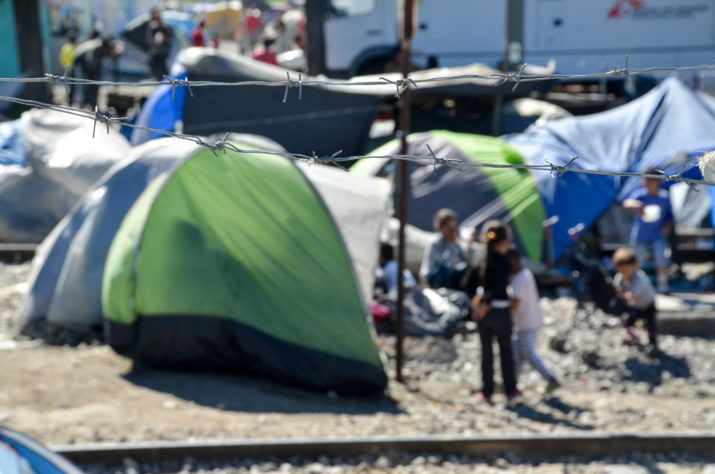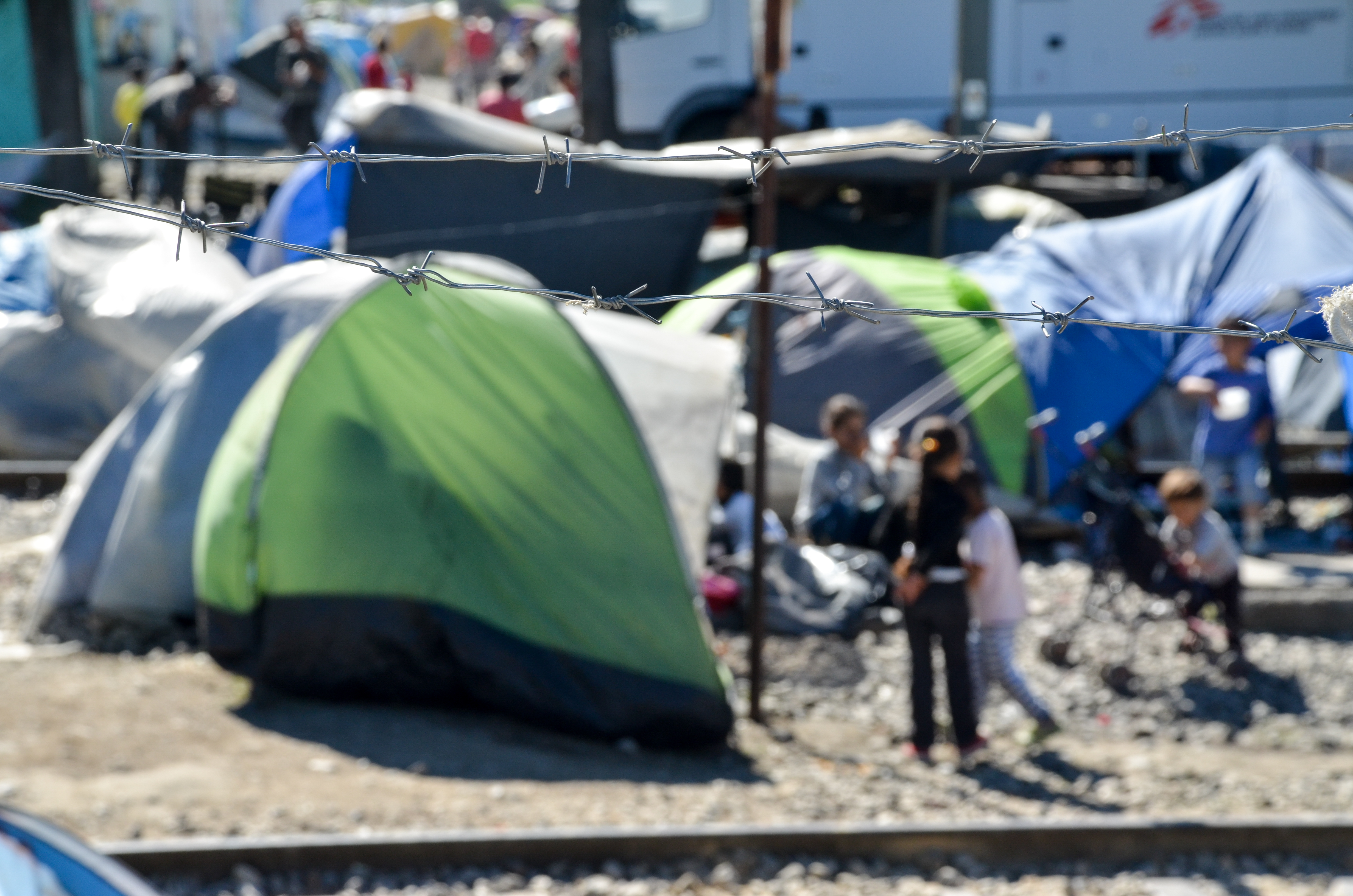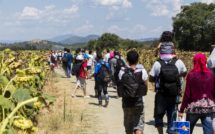

This is part of a round table on the refugee crisis:
-
“Refugees in Athens: There is No Humanity in this Place” by Melissa Kerr Chiovenda
-
“Criminalizing the Mediterranean Leads to Death and Division” by Sharon Jacobs
-
“’I am Odysseus:’ Tracing Mobile Desires and Resistance to Confinement Through Pseudonyms” by Árdís K. Ingvars
Since the summer of 2016, I have been conducting ethnographic fieldwork in Athens, Greece with refugees and asylum seekers from Afghanistan. During this time, I have encountered many refugees who are disillusioned with Greece. Europe, they told me, was a place where human rights should matter, and where acts of humanity decide the tenor of relationships, including the decision to grant or deny asylum. Yet, many refugees find themselves disappointed as they struggle with an overloaded system that seems created to exclude as many as possible, even those who come with legitimate fear for their life. Many hope that this is a Greek problem, not a European problem, and that if they manage to move to another European country, the situation will be different. However, those who do find a way to enter another European country, which is no easy task as asylum cases are decided at the country of entry, often report further disappointment.
This might be the root of the misunderstanding that often occurs when refugees arrive in Europe. Many refugees I speak with understand human rights to mean dealing with people as humans in need of care and compassion, and find instead that they enter a realm of legal technicalities in which they must play a “game” in order to have an asylum case accepted. The misunderstanding leads to unhappiness and angst on the part of the refugees, and frustration on the part of Europeans who want to know why refugees can’t just understand the limits of what can be offered to them. Refugees rightly understand human rights to be something born out of a European/Western liberal intellectual tradition. They question why the burden of proof as to whether they are a legitimate refugee falls so squarely on their own shoulders. Europe and other Western countries, they surmise, purport to be the places where individual rights and liberties are most valued – so why are they not more generous in offering them to asylum seekers in need of refuge? Some of this was familiar, as it sounded very familiar to the concerns of the Hazaras, the ethnic minority I previously conducted research with in Hazaras. Hazaras expected that NATO, the UN, and the United States, due to their interest in promoting an agenda of human rights, would be particularly interested in their plight as a historically oppressed group. However, promoting Hazara rights is not politically expedient for the international community in Afghanistan, and the resulting realpolitik was puzzling to my informants.
One conversation in Athens stands out to me. Along with my husband Andrea (who conducts research with me), I met with two Afghan men who had arrived in Greece two years earlier – relatively recently. Their cases had been dragging on during this time, which is not unusual. Although cases should be examined within six months, extensions and delays often go on for several years (Greek Council for Refugees). One of the men we were meeting with had a strong case. He was kidnapped by the Taliban for coaching a women’s sports team and after being tortured, had escaped. One had come with his family to escape the war, and had a hard time securing access to medical and dental care. The camp they were in provided minimal care, and he struggled to find a hospital that would address his and his family’s medical needs, even as his wife, after being beaten in a disagreement with another family in the camp, delivered a very premature baby. On this particular day, standing on the edge of a makeshift cricket pitch where they were playing, they started asking, “Where are the human rights? Europe is the place of human rights! But we don’t see any human rights here! There is no humanity in this place!” Their anger and frustration at what seemed to be a lack of sympathy from Greeks was palpable.
There is a very different understanding as to what human rights should be, between the refugees, those who make asylum decisions, and policy makers. In 1948 the Universal Declaration of Human Rights was ratified and has since served as the basis for numerous treaties and laws. In 1951 the Convention Relating to the Status of Refugees was ratified, defining the rights of asylum seekers and the responsibilities of states towards them. These are conceived to be two separate legal frameworks, even as in practice they exist in dialog with one another (Chetail 2014), as articulated by the men I was speaking with on the cricket field that day. Even while they are not legally binding, the existence of such codified frameworks ensures that there is a minimum standard to which recalcitrant nations can be held on such issues. This is clearly important as many European countries, the United States, and Australia turn away from their responsibilities to asylum seekers. Having clear frameworks in place, even if they are minimally enforceable, provides some standard and some platform from which to address such issues. Of course, this is a simplified reading that does not address the issue of agreements between EU member states concerning refugees, which can often benefit wealthier countries further from points of arrival and leave countries such as Greece or Italy to deal with much of the problem on their own. But the point still stands – many refugees see human rights and responsibilities towards refugees as something that should by definition be personal and on a human-to-human level, whereas European bureaucrats see them as a set of guidelines that must be followed to the letter. Such an attitude from the bureaucrats can exist because of a sincere desire to uphold a system of international law that betters the situation of so many people, but it can also manifest as an effort to “disqualify” any asylum seeker that does not appear to fulfil the particular requirements for acceptance as a refugee.
In other words, could it be that the very standards which should uphold individual rights had removed the human element from the situation? This is what the two asylum seekers had been telling me. “Where are human rights here?” they asked, rhetorically, as to them, they were not being treated in a human, a humane, way. From the standpoint of the Greek authorities, however, and the EU, and UNHCR, efforts were made to ensure the bare minimum was being done to stay within the parameters of the Refugee Convention (which my informants seemed to understand to be part of human rights law).
It is significant that I say “bare minimum.” For some refugees, in some situations, things are not so bad. In the camps around Athens, refugees live in comfortable, climate controlled container trailers. They are allowed to work. They receive a stipend. The hardest part is the waiting, which takes years. Others, particularly those held in the island camps, experience much worse. The deplorable conditions from a few years ago, in camps around Athens such as Malakasa or Elliniko, or the conditions of the camps in the islands, such as Moria, are well documented. Until recently, camps on the mainland were made up of tents, with little protection from extreme heat in summer and in some areas, plummeting temperatures and snow in the winter. Moria and other island camps are still overcrowded, consist largely of tents, and the conditions and lack of care are such that many people’s mental health is deteriorating (Ekatherimini 2018).
What many asylum seekers are most frustrated with is the asylum process itself, with its long wait and sometimes incomprehensible decision-making process. Suspicion that asylum seekers are trying to game the system and get access to Europe “unfairly” according to the guidelines of the 1951 Convention (and to be honest, some are) causes them to be viewed as con-artists, rather than as people who really need help. I write this as someone often asked to give “expert country of origin opinion” on the situation of asylum seekers, by multiple European countries, the United States, and Australia, based upon the significant amount of research I’ve done in Afghanistan. Some of the questions I am asked to consider are preposterous. For example, a recent case involved two minors, who had been around 12 and 15 when they left Afghanistan. There was suspicion because the younger child did not adequately understand the military-political-insurgent faction that was posing a threat to his family. Does any 12-year-old in the United States or Europe understand local politics? There was also suspicion because the children said their father had been kidnapped, but they did not have “documents” proving this. What sort of documents did they want? A police report? It would have been unlikely that they would have gone to the police since it would have been wiser to go to a local council of elders to try to secure the release if the father in many cases, and they do not give documents. The police themselves might not even give documents, given the state of such institutions in Afghanistan, and given the fact that it is often the police themselves who are occupied with fighting Taliban and other insurgent factions on the front lines, as much as the Afghan National Army. And if they did, why would the kids have them? Why not an uncle or aunt? And if the kids had them and carried them on their journey from Afghanistan, what are the chances they could keep hold of them during the journey? The authorities of this particular country were not treating these as minor children in need of help. They were treating them as people trying to wrongfully gain access to Europe, and so the authority’s goal was not to help asylum seekers, but rather to find a reason to turn them away. I see my informants’ point. This is not a human, or humane, way to act.
In some ways this problem is unavoidable. Naturally, the necessity of a codified set of guidelines detailing human rights and responsibilities towards refugees will remove some of the person-to-person “humanity” of interactions – this is a function of bureaucracy. And while it is certainly true that there will be individuals working within the institutions that deal with asylum cases who subvert the dry bureaucratic nature of the system and bring the human element craved by the refugees, it is equally true that there are those who will work against the system, and actively try to thwart refugees’ attempts to access legitimate rights to asylum and care.
Following the guidelines too closely, and actively trying to deny anyone whose story doesn’t quite fit the necessary parameters, results in possibly turning away those who legitimately need protection, yet struggle tell their stories, or who, despite not meeting criteria for asylum, face terrible repercussions should they be deported. I think of one friend, who left Afghanistan as a small child. He worked for a while in Pakistan, and in Iran, before coming to Greece as a teenager, about 15 years ago. It was decided that while he did not qualify for asylum, he could get temporary protective status, as it was acknowledged that Afghanistan is dangerous. He stayed in Greece, learned the language fluently, studied, worked, was an upstanding member of society. Suddenly his temporary protective status was revoked, despite his long stay in Greece, ostensibly to an improving security situation in Afghanistan. He decided to try to take on a new identity and move to a new European country to start the process from step one, but he was caught with forged documents. Not only had he lost his status, but was prosecuted, and lost the right to work and to rent an apartment. “I blame them,” he said. “They pushed me to this. I didn’t want to leave here. But when they revoked my status what choice did I have? No other choice. And so I did that because of them. And that is what I told the judge.” It is not clear whether this individual might eventually face deportation. It is worth noting his home province in Afghanistan, which he hasn’t seen since he was a small child, has recently been the center of brutal Taliban attacks, resulting in the death of at least 100 civilians, and as many as, if not more than, 200 Afghan security forces (Muzhary 2018). He should certainly be given protection, if nothing else. A bit of humanity would allow any judge or prosecutor to acknowledge that he did not break the law to hurt anyone, but rather because he saw no way to resolve his situation without doing so.
Arriving in Europe and finding that you are not dealt with on a human level, but rather on a bureaucratic level of the worst kind, surely pushes many into some kind of criminality. Much of my research is in Exarcheia, an anarchist neighborhood where petty crimes, such as drug use and even selling are tolerated as long as they don’t impede anyone else’s ability to be well. Exarcheia is de facto administered by the leftists and anarchists – that is not to say the Greek state is completely absent, but they are usually not patrolling and arresting petty criminals like drug users, as this would cause an extremely strong backlash. Those asylum seekers who do sell drugs, in Exarcheia, and nearby Omonia, surely did not set out with the idea that this is what Europe would be for them. In Omonia, the square is full of small-time drug sellers, and the police regularly round them up. I am sure that if things were different, if Greece were not so overloaded and other European countries did a better job of supporting Greece, and if there was more effort to provide a path to integration for these people, then most of them would not turn to petty crime.
Youth are also pushed into prostitution by this situation. I have encountered them and spoken with them in the parks and cafes where they congregate, and at least one study and several news reports have documented the issue (Vasileia and Babha 2017, Smith 2018). Large numbers of young teenagers and youth deciding to sell themselves for a few euros should be seen as a social problem that needs to be dealt with directly. If asylum seeker care is allowing this to happen, then something is going wrong. Those less sympathetic might say they do this for drug money. Perhaps their situation makes them need the escape of drugs. Whatever the case, these are the most vulnerable, in Athens, at least, and while there may be some programs, it is clearly not of a scale to address the problem.
So, who in Athens is treating the refugees, the asylum seekers, the migrants in this human, or humane way, that they want to be treated? In my experience, it is the far left – anarchists and socialists, and volunteers who work with them. While many of them promote an idealized world of open borders that is not feasible in the current world of nation states (although it might be a worthy goal), the main goal I found in their operations was to support refugees with dignity, and to provide whatever care that is needed, rather than top-down programs and policies. Many work and provide housing in abandoned building are taken over and turned into housing areas. Some, such as the well-known City Plaza, are verging on a sort of utopia, whereas others are just the basics – a place to sleep – but the dignity and privacy of the individuals is always put first. Many associated with these projects spend a few months working for one of the bigger, international organizations, in some capacity, for salary. They don’t believe the donor-driven approaches of these organizations work, though. When they can, they return to a collective and try to assist refugees and asylum seekers with the needs the refugees identify. These are all-volunteer and run entirely by donation. Could this be scaled up? I am not sure – it might be that any sort of scaling up would require the imposition of rules and norms that would destroy what it is that is making these organizations work. But perhaps something can be learned from their model all the same, and the flexibility and willingness to address the need of the individual could be partially implemented in larger organizations.
There are some organizations that seem to be a sort of mix of the radical collective and the traditional NGO, that provide a menu of services to anyone (including Greeks and non-Greeks) but that also work to find solutions elsewhere to problems they can’t address themselves. One such organization is Solidarity Now. Psychologists and translators become social workers in this setting, but this is what is needed. I spoke with a psychologist for such an organization that also tried to help secure housing, and at times cared for the children of, her most at-need clients. She explained that in such a situation as is happening now in Greece, where there is a need not only to provide care for migrants, but for Greeks who are suffering what seems a never-ending economic crisis, that leads to a social crisis, the only response is “all hands on deck.” So while the issue might be too large for the collectives to fully take on, there may be something to be learned from them.
This is not to say that other providers of care for refugees are doing a terrible job. But organizations by definition have a structure and a hierarchy – for good reasons. This allows those working there to replicate care from one locale to another, to bring lessons learned in one place to another, and to increase the scale of operations. Standardization in care is not necessarily bad. But again and again, refugees and those working in cooperatives and communes told me that top-down approaches just didn’t capture the needs of any given time; that more flexibility was required; that what was needed was to find the most pressing problems and quickly act on those, rather than follow a set of protocols. This is also more human – respond to the needs to the human in front of you, listen to what she tells you. If this sort of flexibility can’t be provided for in the hearing of asylum cases, then perhaps it is all the more important to try to put it into practice in care.
Melissa Kerr Chiovenda is an assistant professor of anthropology at Zayed University in Abu Dhabi. She earned her PhD from the University of Connecticut in 2016, and her dissertation research focused on collective and cultural trauma of ethnic Hazara activists seeking to secure rights and acknowledgement of atrocities and oppression perpetrated against them in Bamyan, Afghanistan. Since 2016 she has conducted research with early arrival Afghan refugees in Greece who are politically active in attempting to secure rights for more recently arrived asylum seeker.
References:
Chetail, Vincent. 2014. “Are Refugee Rights Human Rights? An Unorthodox questioning of the Relations Between Refugee Law and Human Rights, “ in Rubio-Marin, Ruth, ed. Human Rights and Immigration. Oxford: Oxford University Press Scholarship Online.
Digidiki, Vasileia, and Jacquline Babha. 2017. “Emergency Within and Emergency., The Growing Epidemic of Sexual Exploitation and Abuse of Migrant Children in Greece. Harvard University: FXB Center for Health and Human Rights
Ekatherimini, 2018, “As Police Raid Malakasa migrant camp, Moria struggles with bad weather.” Ekatherimini Online, http://www.ekathimerini.com/233182/article/ekathimerini/news/as-police-raid-malakasa-migrant-camp-moria-struggles-with-bad-weather, accessed January 17, 2019
Greek Council for Refugees. 2018. “Health Care”, Asylum Information Database, European Council for Refugees and Exiles, https://www.asylumineurope.org/reports/country/greece/reception-conditions/health-care accessed January 17, 2019
Muzhary, Fazal. 2018. “Unheeded Warnings: Looking Back at the Taliban Attack on Ghazni.” Afghan Analysts Network. https://www.afghanistan-analysts.org/unheeded-warnings1-looking-back-at-the-taleban-attack-on-ghazni/, accessed on January 17, 2019
Smith, Saphora. 2018. “Young Migrants Trapped in Greece Find that Life in West Isn’t what they Hoped for.” NBC News Online.
Trilling, Daniel. 2017. “Afghan Refugees in Greek Camp: If you kept animals in this situation, they would die.” IRIN https://www.irinnews.org/feature/2017/06/02/afghan-refugees-greek-camp-%E2%80%9Cif-you-kept-animals-situation-they-would-die%E2%80%9D accessed January 17, 2019
Photo: Idomeni, Greece – August 19 , 2015: Hundreds of immigrants are in a wait at the border between Greece and FYROM waiting for the right time to continue their journey from unguarded passages
Published on February 5, 2019.




